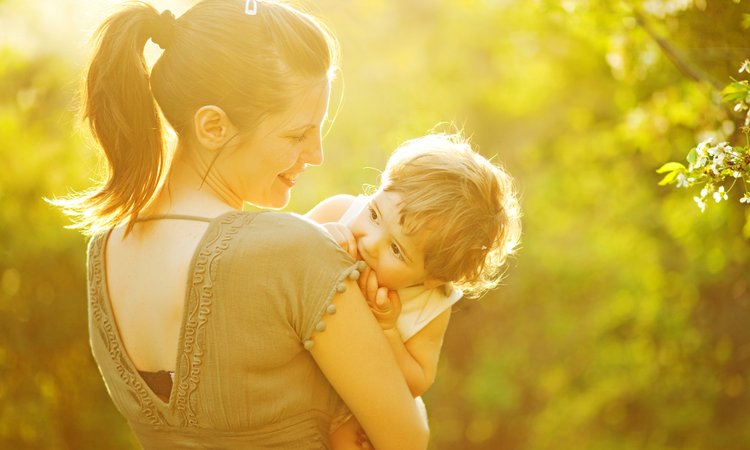The first time my infant daughter was handed to me after birth, I looked at her black, fuzzy hair and swollen face with its miniature features of myself and searched for a connection. You know that overwhelming feeling of joy that new mothers often speak of, the one Hallmark cards are made of? I was supposed to feel it. But I didn’t.
At almost 6 pounds, she was completely vulnerable, seeking my warmth instinctively. I gave it to her because I knew it was what a good mother did, but something was missing. I couldn’t feel love or connection.
This feeling haunted me through her first year. I later discovered it’s a common part of postpartum depression, something few mothers are willing to talk about. Especially since I could not breastfeed, in combination with out-of-whack hormones, it was simply harder to forge an emotional bond with my daughter. My therapist assured me it would take time, but I felt tremendous guilt.
What kind of human being are you, anyway? I would ask myself. Not feeling love for your own precious daughter? I would watch her tiny body fall asleep in her electric swing and long to feel the way a mother should. I enviously watched mothers make cooing sounds and tickle their children at the playground and in mothers’ groups and began to do it, too, out of earnestness. I wanted to love her.
I asked people, hesitantly, in a roundabout way, if my feelings were normal and quickly understood that few people want to address or acknowledge this topic. Even the instructor of a writing workshop I attended merely asked, “How is your daughter going to feel about this essay when she gets older?” She slashed through the whole of the essay except one sentence.
Clearly, no one wanted to hear the deep-seated thoughts behind this depression. Although postpartum depression is thought to be a result of huge hormonal shifts, it triggers disturbing thoughts: Do I believe in human beings enough to be a mother? Is it possible to raise an ethical, caring human being? These thoughts were in my mind even before I had a child, but postpartum depression brought them to the surface.
And then, all of a sudden, I began writing about it. I wrote and wrote poetry. Page after page, draft after draft, I faced the reality of what it means not to be able to connect with another human being whose life depends on you. I examined the night feedings, the shadowy days of little sleep when I felt taken away from the present and could not be with my child emotionally.
I wrote it all down, I sought therapy, I kept writing, I took medication; it all helped. I spoke to my husband and dearest friends about how desperately I wanted to be a mother. My daughter grew older in the other room with my husband and family as I wrote, and as I wrote I felt an enormous gap being closed.
Then I woke up one morning about a year later and realized I could not wait to see her face, to smell her skin, to make her laugh. We got to know each other, and I saw her first smiles when her father and I performed a terrible dance routine. It snuck up on me, as love does.
My poems were dark and harrowing and scary. But they allowed me to face my fear that I was not strong enough to believe in a person more than I believed in myself. Writing was an act of courage; rather than a testament of feeling, the very act itself became a way for me to look at my daughter, her large eyes and, by now, long dark hair, and say to myself, What am I supposed to do with you now?
In all honesty, I still don’t know what I’m supposed to do with her, but I try. When she was one year old, I chased her in parking lots in 100-degree heat, stopping traffic; when she was two, I sat in her room and held her while she screamed. I rocked and sang so many nights and gave her comfort that, in many ways, I had never been given.
I faced my second pregnancy with both excitement and fear; I didn’t want to go through the same depression after the baby was born. Luckily, though I was prepared, I was spared the second time. Most of the challenges came during the pregnancy itself, as I struggled with pre-term contractions and was ordered to stay on bed rest.
Some people say you always remember your true birthday, the day you were truly born. For me, that day was March 21, 2012, when my first child was two years old. I had been on bed rest for several months, and the doctor had just given orders that I was safe to go home. Every night, in almost a vigil, I had been pressing and unpressing my cell phone in the night from my hospital bed just to see my daughter’s face pop up on my screensaver.
When my husband came in with her, I was sitting on the couch, ready to go. My daughter walked up to me, took her pacifier out of her mouth, and said, “Let’s go home, Mommy. I will take you.” She held out her hand and literally pulled. And I went with her.
Click here to see Rose’s tips for healthy and happy relationships



1 Comment
Shane
I’ve been absent for a while, but now I reemmber why I used to love this blog. Thanks, I’ll try and check back more frequently.